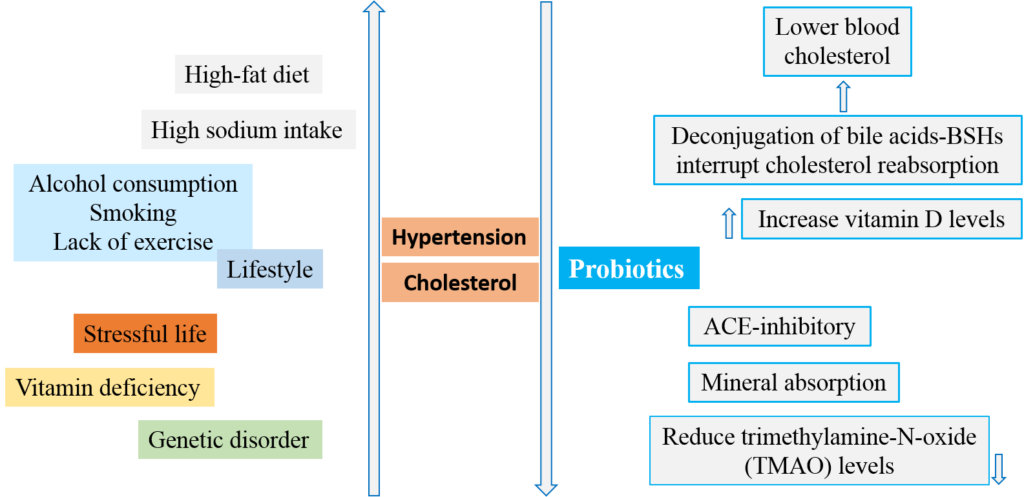Could The Microbiome Be Part Of The Longevity Solution?


PRO-SUPPORT
01 -
HEALTH BENEFIT
Cardiovascular disease (CVD) has historically been one of the leading causes of premature deaths globally. It is one of the most significant factors affecting lifespan worldwide. It encompasses various conditions that affect the heart and blood vessels, such as coronary artery disease, stroke, heart failure, and high blood pressure. It can result from a combination of genetic factors, lifestyle choices (such as diet, exercise, and smoking), and other chronic medical conditions (like diabetes and obesity). Gut microbial imbalance due to unhealthy diet is increasingly being recognized as a possible risk factor in cardiovascular diseases. Diet modification to alter the composition of gut bacteria is vital for either prophylaxis or the improvement of cardiovascular diseases. Certain probiotics have been shown to benefit heart health by influencing factors such as inflammation, cholesterol metabolism, and blood pressure regulation. A small reduction of blood pressure may have important health benefits and cardiovascular consequences. The findings from the HOPE (Heart Outcome Prevention Evaluation) study showed that a modest reduction of systolic blood pressure (SBP) by 3.3 mm Hg and diastolic blood pressure (DBP) by 1.4 mm Hg was associated with a 22% reduction in relative risk of cardiovascular mortality, myocardial infarction, or stroke [1]. Managing risk factors and adopting a healthy diet can significantly reduce the likelihood of developing cardiovascular diseases and its associated complications, which is the primary contributor to a longer lifespan.

02 -
GUT DERIVED METABOLITES
Microbiota help convert our foods into energy packets. The gut derived metabolites are the compound produced when microbe in the gut break down nutrients from the food. Some probiotic strains have the ability to produce an enzyme called bile salt hydrolase. This enzyme makes cholesterol less absorbable so that instead of being absorbed into the bloodstream, it becomes trapped in the gut, then later excreted in fecal matter, helping lower blood cholesterol levels. Another microbiota metabolites short chain fatty acid (SCFA), include acetate, propionate, and butyrate have been found to be involved in blood pressure regulation [2]. PRO-SUPPORT supplement with proportionately balanced probiotic strains to remodel the gut microbiome composition, causes a beneficial shift in intestinal microbial population towards an improved cardiovascular health.

03 -
BLOOD PRESSURE and Cholesterol
An increasing number of clinical evidence supporting the probiotic-dependent attenuation of hypertension and hypercholesterolemia could provide immense support for the application of such cultures to improve cardiovascular health [3]. Hence, dietary intervention to correct gut microbiota could be an innovative nutritional therapeutic strategy for cardiovascular health.
Angiotensin-converting enzyme (ACE) plays an important role in the regulation of blood pressure by converting angiotensin I into the vasoconstrictor angiotensin II, and inactivating the vasodilator bradykinin, thereby increasing the blood pressure. Probiotics have been reported to exert ACE-inhibitory activity by producing antihypertensive bioactive peptides [4]. In addition, probiotics may improve blood cholesterol. A recent meta-analysis on the effects of probiotics on blood lipids reported a significant 6.4 mg/dL reduction in total cholesterol, a 4.9 mg/dL reduction in low-density lipoprotein cholesterol level, and a 3.9 mg/dL reduction in triglycerides level [5].
In addition to these suggested mechanisms, probiotics also have a positive effect on arterial stiffness, where arterial stiffness is an independent predictor of cardiovascular morbidity and mortality, which have been associated with hypertension [6].
The mechanism of probiotics intervention on cardiovascular health was discussed by Dr. Upadrasta as illustrated in the figure [7].


Causative agents of cardiovascular health and potential modes of probiotic action
REFERENCE:
ALL INFORMATION PRESENTED IN THIS WEBSITE IS INTENDED FOR INFORMATIONAL PURPOSES ONLY AND NOT FOR THE PURPOSE OF RENDERING MEDICAL ADVICE. THE INFORMATION CONTAINED HEREIN IS NOT INTENDED TO DIAGNOSE, TREAT, CURE OR PREVENT ANY DISEASE.






